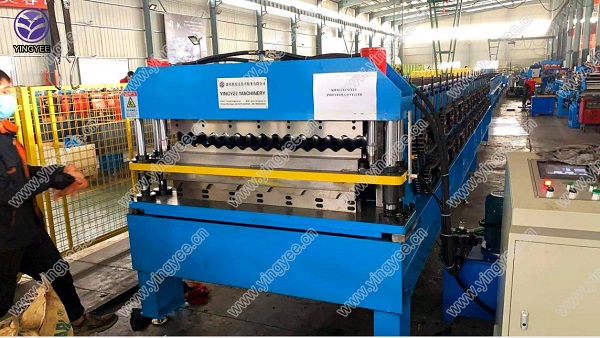The Downpipe Roll Forming Machine A Game Changer for Manufacturing Efficiency
In the ever-evolving world of manufacturing, the quest for efficiency, precision, and cost-effectiveness is ongoing. One of the standout innovations in this field is the downpipe roll forming machine. This machine is designed specifically for the production of downpipes—critical components used in rainwater drainage systems on buildings. The adoption of downpipe roll forming technology has revolutionized how these essential elements are manufactured.
What is a Downpipe Roll Forming Machine?
A downpipe roll forming machine is a specialized piece of equipment that shapes metal sheets into the desired profiles for downpipes. Utilizing continuous roll forming processes, it takes flat metal strips as input and transforms them into various shapes through a series of rollers. This method allows for high-speed production and ensures that the products meet precise specifications in terms of size and shape.
The Benefits of Using a Downpipe Roll Forming Machine
1. Efficiency and Speed Traditional methods of manufacturing downpipes can be time-consuming and labor-intensive. In contrast, a roll forming machine operates continuously, allowing manufacturers to produce large quantities of downpipes in a fraction of the time. This high throughput makes it an attractive option for businesses looking to scale their operations without sacrificing quality.
2. Cost-Effectiveness While the initial investment in a downpipe roll forming machine may be significant, the long-term savings can be substantial. The efficiency of the roll forming process reduces labor costs and minimizes material waste, resulting in a lower overall cost per unit produced. This financial advantage can significantly impact a manufacturer’s bottom line.
downpipe roll forming machine
3. Precision and Quality Roll forming technology provides a high level of precision in the production of downpipes. Each piece is manufactured to exact specifications, ensuring consistency across large production runs. This is particularly crucial in industries where quality control is paramount, such as construction and building materials.
4. Versatility A downpipe roll forming machine can be designed to handle various materials, including galvanized steel, aluminum, and other metals. Manufacturers can adjust the setup of the machine to produce different profiles and sizes of downpipes, which makes it a versatile asset for any production line. This flexibility enables companies to cater to a broader market, responding effectively to customer demands.
5. Reduced Waste The roll forming process inherently produces less scrap material compared to traditional cutting or stamping methods. As sheets are formed rather than cut, the material utilization is optimized, which not only saves money but also aligns with modern sustainability goals.
6. Automation and Integration Many modern downpipe roll forming machines are equipped with advanced automation technology. This allows for easy integration into existing production lines while reducing the need for manual intervention. Automated systems also enhance safety and operational reliability, allowing staff to focus on other critical aspects of the manufacturing process.
Conclusion
The downpipe roll forming machine represents a significant advancement in manufacturing technology, particularly in the production of downpipes for construction and drainage systems. Its efficiency, cost-effectiveness, precision, and versatility make it an indispensable tool for modern manufacturers. As industries continue to evolve and adapt to new challenges, the roll forming machine stands out as a prime example of how technological innovation can lead to enhanced productivity and sustainability. For manufacturers looking to streamline their operations and improve product quality, investing in a downpipe roll forming machine may very well be the key to success.







